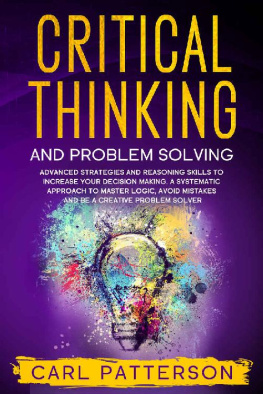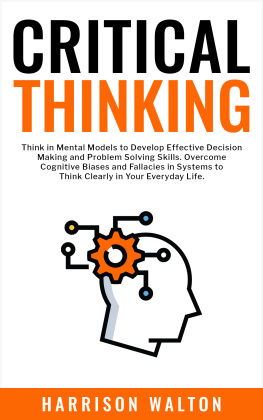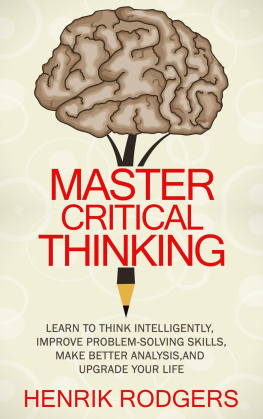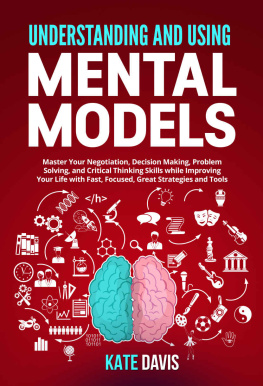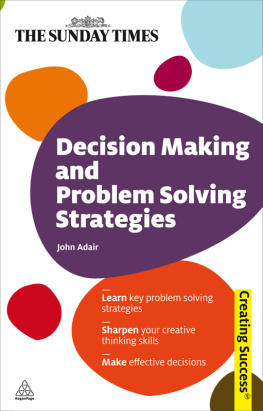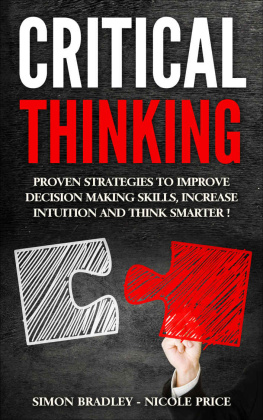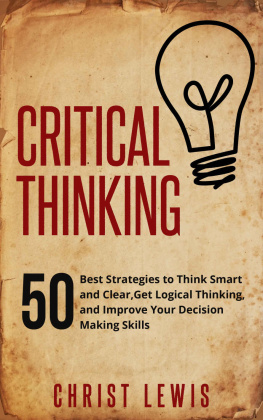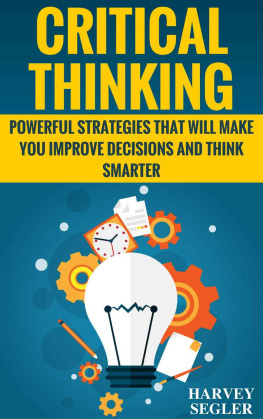Critical Thinking
8 Powerful Strategies That Will Help You Improve Decision Making Skills, Think Fast and Clear!
Table of Contents
Introduction - What is Critical Thinking?
F or some readers, the concept of critical thinking is a foreign concept and although you think you may know about the topic, maybe there is information you arent aware of.
First and most importantly, critical thinking can be defined as thinking in a clear rational way after analyzing whatever has entered your brain. It also involves making clear, reasonable judgments. Making these choices and analyzing is based on your personal observation and interpretation of what is happing. Those who exhibit highly developed critical thinking skills use realistic evidence, and context clues to isolate and identify any type of problem. Problem solving his also highly important when it comes to the critical thinking and decision making process.
Basically, critical thinking is the way to interpret information and analyze it when it enters your brain. You do this through gathering information, looking at the facts of the situation, basing these things in reality, thinking about yours or others values, pinpointing any problem and coming to a conclusion. This conclusion then leads to decision making and taking action.
Now that you have a better understanding as to what cognitive thinking is, it is important to also understand what it means to improve this type of skill. Think of other things you have maybe attempted to improve at: dance, writing or running just to name a few possibilities.
When you made the decision that you wanted to improve at these things, you first assessed your skill and ability level. You then sought out ways to learn more about the topic, educated yourself and implemented what you learned into your daily practice. In the end, you had to make a commitment and begin practicing to become better. The same can be said for improving your critical thinking skills. You first need to assess your ability level, get educated and gather information and then make a commitment to yourself and improvement. Although running and critical thinking may not seem the same, the ways we learn and improve are both is very similar.
First, lets assess your current level of critical thinking ability. You should assess yourself and place yourself in one of six possible categories. The first category is a stage where youre defined as an unreflective thinker. This means, you have significant problems in your critical thinking and decision making process but you are unaware of them either because you are choosing to be will fully ignorant or youre subconsciously pushing it aside.
The second category is for challenged thinkers. You are aware that there are some issues with you thinking and although you know it is a problem, you arent doing anything about it. Third, is the category of beginning thinkers who are attempting to improve their thinking but arent doing so on a regular or consistent basis. In stage four, you become a practiced thinker. Meaning, you realize there is an issue in your critical thinking skills and you are practicing to improve. If you find youre a part of this group that means you have realized the importance of making improvement a daily practice. This realization in itself means you are being honest and up front with yourself and this is something to be proud of!
Now, we have levels five and six, which is ultimately where we all hope to end up with our critical thinking skills. In these groups, you are advancing your level of understanding and practice and beginning to improve. When you finally hit the targeted sixth group, this means you have mastered your critical thinking skills and practicing this mastery come naturally to you.
So, first, put yourself into one of the groups and lets begin learning how you can move up to the sixth group and master your critical thinking skills!
Chapter 1 - Utilizing Wasted Time
A s humans, its one of our natural faults to waste time. We oftentimes arent using our time as wisely or as positively as we could. Many times, we avoid using our time to the best of our ability because we are unsure how or maybe we are distracted with too many other things. Wasting time can even consist of dwelling on the past and what you could have done differently or possibly looking back on regrets you may have. This wastes your present time that you could be using on present, critical thinking.
To help change these wasteful habits, you first need to come to terms with where and when youre wasting your time the most. Are you watching TV for too long in the evening or weekends? Are you lying in bed at night, thinking of all the regrets you have from the past week, or even the last month? Are you spending time scrolling through Facebook or looking at pointless videos on YouTube? The first step to improvement in this area is to realize what behavior is your downfall.
It is also important to ask yourself the following questions to help you better understand what time you may be using foolishly. Such as: When did I have my worst thinking today? When did I have my best? What were my thoughts filled with today? What did I think about the most? If I had the chance to re-live today, what would I change? Did I accomplish something today with my thinking? Ask yourself these questions and be honest with yourself in your answers.
Now, once you have pinpointed where you are wasting or using your time unwisely, you can work to improve it. To do this, its imperative to set goals for yourself. For example, think about where you are wasting your time and how you can instead use that time in a better way. In a real-life scenario, just to give you an example, imagine, every morning, you spend twenty-five minutes scrolling through and looking at various social media outlets. Then, an hour later, you are running late and get stuck in traffic.
You now realize that if you hadnt spent that twenty-five minutes looking through your social media, you wouldnt have been running late, you couldve left for work twenty-five minutesearlier and thus, you now wouldnt be stuck in traffic! Once you begin to realize these things, write down your goals. For example, dont spend time on social media before leaving for work, or dont spend thirty minutes flipping through the TV channels looking for something to watch during or after dinner. Make this list of goals and stick to them!
Chapter 2 - Problem Exercise
I n the third chapter, we are going to discuss an important and helpful critical thinking exercise you can do in your free time to improve your skills. This exercise is something you can do maybe while driving or on any mode of transportation where your mind wanders.
You first want to choose a problem. This problem should be something you can turn into a question and one that related to your goals and personal needs. Now, you want to begin the exercise by stating the problem clearly and concisely.
Now, take time to figure out exactly just what type of problem youre thinking about. Its important, here, to ask yourself if this is the type of problem you can do something about or if its something that is outside your control. If its out of your control, you know you simply need to stop thinking about it and move past it. If it is in the realm of your control though, you can now move forward by beginning to figure out what information you need to solve this problem and begin gathering said information. Once you have gathered the needed information, begin to think about what options you have once you decide to act.
This would be a good time to take into account just what your actions would mean for your time and money. Finally choose your strategy for action. Its important to ask yourself if you think its appropriate to take immediate action or should you maybe wait-and-see what happens and then act later on, depending on what starts to happen.
Next page

